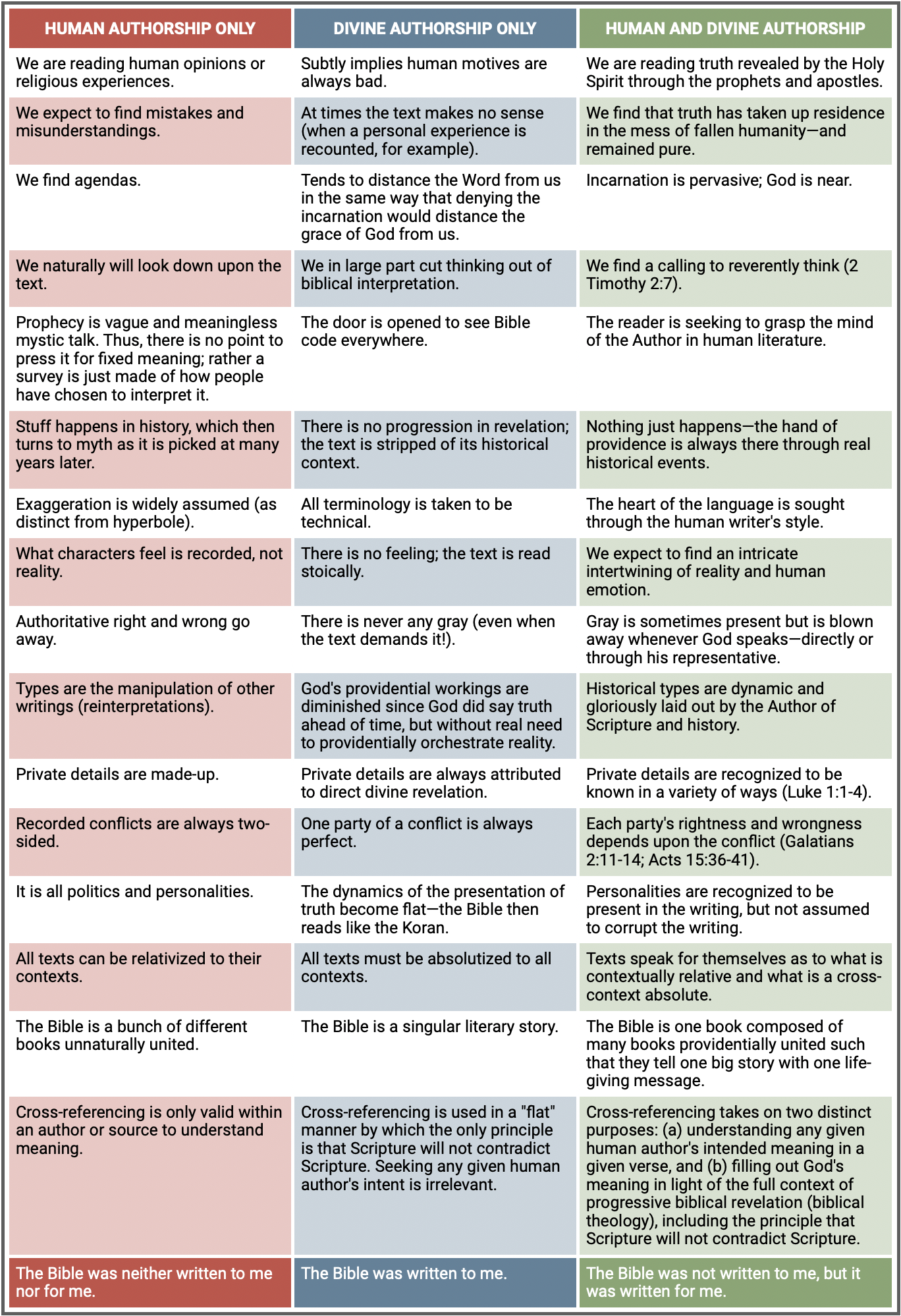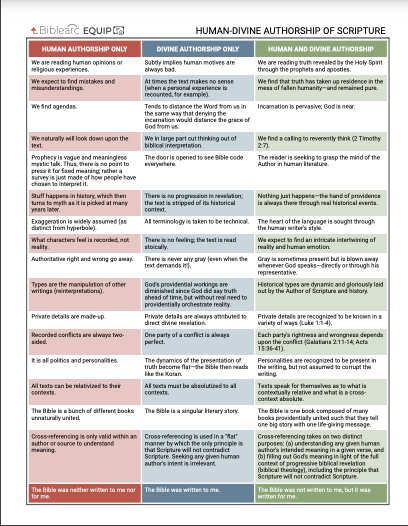Lesson 1: Laying the Foundation
The Authors of Scripture
We must also consider the authorship of Scripture. Like all aspects of hermeneutics, this too is a lens through which we read and interpret. When this lens is poorly constructed, our interpretation suffers greatly.
Some people understand the Bible to have merely human authorship. That is, it was written by people with unique personalities and experiences, who understood the world and God in different ways and simply recorded their personal religious experience. Others understand the Bible to have merely divine authorship. They would insist that God alone wrote every word that was written down, rendering the human writer no more than a scribe for the true author—God.
These are two very different lenses! Which of them is correct? Neither and both.
The Bible teaches us to use a third lens—one which considers both its human and divine authorship.
The Bible's Human and Divine Authorship
Men spoke from God...
First, the Bible makes its human authorship clear by psalm titles, book introductions, and letter greetings.
A Psalm of David, when he fled from Absalom his son. —Psalm 3, title
The words of Amos, who was among the shepherds of Tekoa, which he saw concerning Israel in the days of Uzziah king of Judah and in the days of Jeroboam the son of Joash, king of Israel, two years before the earthquake. —Amos 1:1
Inasmuch as many have undertaken to compile a narrative of the things that have been accomplished among us, just as those who from the beginning were eyewitnesses and ministers of the word have delivered them to us, it seemed good to me also, having followed all things closely for some time past, to write an orderly account for you, most excellent Theophilus, that you may have certainty concerning the things you have been taught. —Luke 1:1–4
I, Paul, write this greeting with my own hand. —1 Corinthians 16:21
...as they were carried along by the Holy Spirit
The Bible makes its divine authorship clear by referring to itself as the “Word of God” and by citing God as the speaker even when quoting the specific words of human authors.
Now the word of the LORD came to me, saying... —Jeremiah 1:4
And when they heard it, they lifted their voices together to God and said, “Sovereign Lord, who made the heaven and the earth and the sea and everything in them, who through the mouth of our father David, your servant, said by the Holy Spirit... [quote from Psalm 2].” —Acts 4:24-25
Of the angels [God] says, “He makes his angels winds, and his ministers a flame of fire.” But of the Son he says, “Your throne, O God, is forever and ever, the scepter of uprightness is the scepter of your kingdom.” —Hebrews 1:7-8, quoting from Psalm 104 and 45
The Bible's Inescapable Teaching
Thus, the Bible teaches both human and divine authorship. But what is most interesting is how these two realities come together in the Bible’s direct teaching on the subject. There are two key texts which explicitly teach God’s ultimate authorship of all of Scripture. In both cases, this assertion is surrounded by the personal testimony and appeals of the human author. This combination makes the following conclusion inescapable: the Bible teaches both its human and divine authorship.
For we did not follow cleverly devised myths when we made known to you the power and coming of our Lord Jesus Christ, but we were eyewitnesses of his majesty. For when he received honor and glory from God the Father, and the voice was borne to him by the Majestic Glory, “This is my beloved Son, with whom I am well pleased,” we ourselves heard this very voice borne from heaven, for we were with him on the holy mountain. And we have the prophetic word more fully confirmed, to which you will do well to pay attention as to a lamp shining in a dark place, until the day dawns and the morning star rises in your hearts, knowing this first of all, that no prophecy of Scripture comes from someone’s own interpretation. For no prophecy was ever produced by the will of man, but men spoke from God as they were carried along by the Holy Spirit. —2 Peter 1:16-21, emphasis mine
You, however, have followed my teaching, my conduct, my aim in life, my faith, my patience, my love, my steadfastness, my persecutions and sufferings that happened to me at Antioch, at Iconium, and at Lystra—which persecutions I endured; yet from them all the Lord rescued me. Indeed, all who desire to live a godly life in Christ Jesus will be persecuted, while evil people and impostors will go on from bad to worse, deceiving and being deceived. But as for you, continue in what you have learned and have firmly believed, knowing from whom you learned it and how from childhood you have been acquainted with the sacred writings, which are able to make you wise for salvation through faith in Christ Jesus. All Scripture is breathed out by God and profitable for teaching, for reproof, for correction, and for training in righteousness, that the man of God may be complete, equipped for every good work. —2 Timothy 3:10-17, emphasis mine
Peter emphasizes both his personal experience as a witness of the transfiguration and the divine Will behind the prophetic word. Paul speaks both of his personal ministry and persecution and of Scripture as the breath of God. The implication is that our hermeneutical lens must consider both the human and divine authorship of the Bible when we read it. Failing to do so will lead us into a multitude of errors.
The Big Idea: We aim to understand what the authors (God and men) meant to communicate. The best interpretation will faithfully and accurately represent this intended meaning.

Pick one row from the above chart that stands out to you. After noting which row you have chosen, explain it and its significance in your own words.
Log in / create an account to enroll or continue where you left off.
Did Human Authors Speak Better Than They Knew?
A lingering question that is not fully answered by the discussion above is whether the biblical writers wrote more than they understood. This is an important question when it comes to the reality of Jesus being foreshadowed through Old Testament types (something we will discuss at length in Lesson 7).
Two quotations from “The Right Doctrine from the Wrong Texts?,” written by two different authors, combine to give us a thoughtful, biblically-balanced response to this question.¹
[T]he Spirit of God may very well have inspired expressions which potentially transcended the thoughts of the sacred writers and of those to whom they addressed themselves. This certainly occurred in the case of Caiaphas (John 11:49-52), and there is no ground to deny the possibility of such a process in the inspiration of the Old Testament Scripture. —quotation from Roger Nicole’s writing
Nonetheless, interpretation of any text should not obviate the intention of the human author. He does have the right to say that certain interpretations of his words are wrong. It should be remembered, though, that God can reveal more through the words of a writer of Scripture than he fully understood. —quotation from Philip Barton Payne’s writing
In other words, a biblical writer now in the presence of God might learn more of what was meant in his own words as he reads them again in the light of God’s full revelation. In such a case, he might be amazed to find that God was saying more than he was thinking as he wrote. But, he would never be inclined to object that his originally intended meaning was being ignored, misconstrued, or abused. Furthermore, 1 Peter 1:10–12 makes clear that biblical writers understood better than most modern interpreters seem to suppose.
One Book, Many Books
We have shown that the Bible was written by many different human authors, while at the same time being ultimately composed by the single, divine Author. Similarly, it is a single Book made up of many books—a fact that likewise affects how we interpret it.
Consider an orchestra. It is made up of a variety of instruments and musicians, with a single conductor. Each musician’s style is distinct, but also shares much in common with those who play the same or similar instruments. And all the parts come together in a single song, even though some instruments play notes in the treble clef, others in the bass clef, and some in both clefs! And the instruments have different sounds: piercing and thin (piccolo), warm and round (French horn), vibrant and bright (trumpet), deep and supporting (double bass), full and stirring (the violins).

This is a picture of the Bible—sixty-six books written by a few dozen authors in a handful of different genres. Given such a structure, we naturally begin our interpretation of a particular passage with reference to the other “notes” of the same “musician.” From there, we also consider the rest of this author’s biblical writings and those of others in the same genre. But still, we are not finished. For even the most distinct books have something to say about each one’s interpretation, since all the biblical books have been masterfully combined into the one, singular Book, by the great Conductor.
